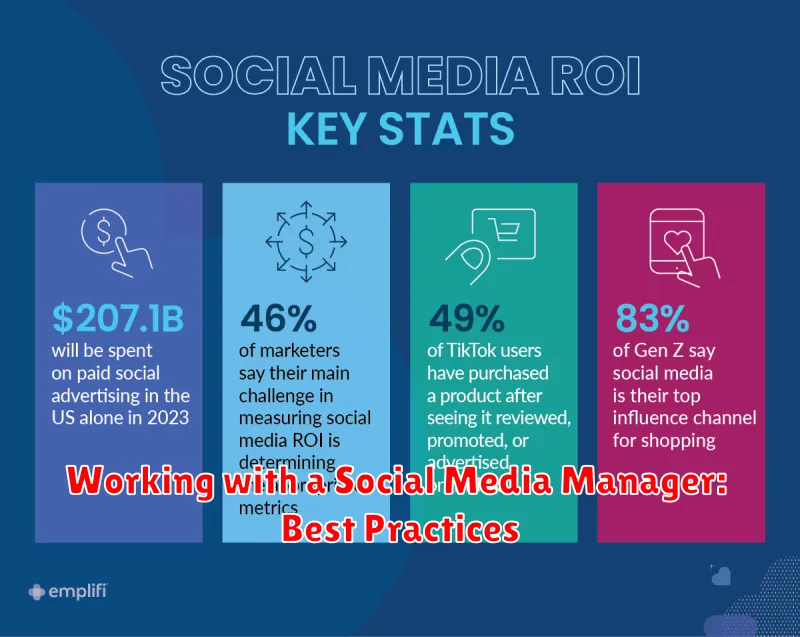In today’s digitally-driven world, a robust social media presence is no longer a luxury but a necessity for businesses of all sizes. To effectively navigate the complex landscape of social media marketing, businesses are increasingly turning to social media managers. But what exactly is a social media manager, and why is this role so critical for your business’s success? This article will explore the multifaceted role of a social media manager, outlining their key responsibilities and highlighting the significant benefits they bring to your organization.
A social media manager is a dedicated professional responsible for developing and executing a comprehensive social media strategy aligned with your business objectives. They are the voice and personality of your brand online, crafting engaging content, interacting with your audience, and analyzing data to optimize performance. From increasing brand awareness and driving website traffic to generating leads and boosting sales, a skilled social media manager can significantly impact your bottom line. If you’re looking to elevate your brand’s online presence and achieve tangible business results, understanding the value of a social media manager is essential.
Defining the Role of a Social Media Manager
A Social Media Manager is a digital marketing professional responsible for developing and implementing a company’s social media strategy. Their primary goal is to build and engage an online community, promote brand awareness, and ultimately drive business objectives through various social media platforms.
This role goes beyond simply posting updates. It involves a deep understanding of the target audience, meticulous planning of content calendars, analyzing data, and adapting strategies based on performance. A Social Media Manager acts as the voice and personality of the brand across social channels, fostering relationships with customers and stakeholders.
They are also responsible for staying up-to-date on the ever-evolving social media landscape, including algorithm changes, new platform features, and emerging trends. This allows them to constantly refine their approach and ensure the company maintains a competitive edge in the digital sphere.
Key Responsibilities and Daily Tasks
A Social Media Manager’s day-to-day involves a diverse range of tasks centered around building and engaging an online community. Content creation is a core responsibility, encompassing developing engaging posts, graphics, and videos tailored to each platform. This includes writing compelling captions and scheduling content for optimal visibility.
Community management is another crucial aspect, involving responding to comments and messages, fostering discussions, and addressing customer inquiries. Monitoring social media trends and analyzing performance metrics are essential for optimizing strategies and ensuring campaigns resonate with the target audience. This data analysis informs future content planning and campaign adjustments.
Running paid social media advertising campaigns is often part of the role, requiring strategic planning, budget management, and performance tracking. Collaborating with other teams, such as marketing and sales, ensures alignment between social media activities and overall business objectives.
Essential Skills and Qualities of a Successful Social Media Manager
A successful social media manager possesses a blend of technical skills and soft skills. Proficiency in various social media platforms is crucial, including understanding their unique algorithms and best practices.
Key technical skills include content creation (writing, graphics, video), data analysis, and social media advertising. Familiarity with social media management tools for scheduling, analytics, and engagement is also essential.
Beyond technical expertise, essential soft skills encompass strong communication, creativity, adaptability, and problem-solving abilities. A keen eye for detail, excellent organizational skills, and the ability to work independently are also highly valued.
Strategic thinking is paramount, as a social media manager must be able to develop and execute effective social media strategies aligned with overall business objectives. Staying up-to-date with the latest social media trends and adapting strategies accordingly is critical for success.
The Impact of a Social Media Manager on Business Growth

A skilled social media manager can significantly impact business growth by strategically leveraging social media platforms. Their expertise translates into tangible benefits, driving both brand visibility and customer engagement.
Increased Brand Awareness: A dedicated manager crafts and distributes content that resonates with target audiences, broadening brand reach and fostering recognition within the competitive landscape. Consistent posting schedules and engaging content help keep the brand top-of-mind for consumers.
Improved Customer Engagement: By actively interacting with followers, responding to inquiries, and fostering online communities, a social media manager cultivates stronger customer relationships. This engagement builds trust and loyalty, converting followers into brand advocates.
Targeted Marketing and Lead Generation: Social media platforms offer powerful targeting tools. A skilled manager utilizes these to reach specific demographics and interests, increasing the efficiency of marketing campaigns and generating qualified leads.
Enhanced Website Traffic and Conversions: Strategically placed social media posts with compelling calls-to-action can drive traffic directly to a business’s website, boosting conversions and sales. This targeted approach ensures that the right audience is directed to the relevant product or service pages.
Measuring the ROI of Social Media Management
Measuring the return on investment (ROI) of social media management can be challenging, but it’s crucial for understanding the effectiveness of your efforts. While not every social media activity directly translates to dollars, there are key metrics that can demonstrate the value a social media manager brings.
Key Performance Indicators (KPIs) provide quantifiable data to track progress towards your social media goals. These may include:
- Reach and Engagement: Track metrics like follower growth, likes, comments, shares, and click-through rates to gauge audience interaction and content performance.
- Website Traffic: Monitor referral traffic from social media platforms to your website. This helps understand how social media contributes to lead generation.
- Lead Generation and Conversions: Track leads generated through social media campaigns and their conversion rates into customers. This directly connects social media activity to sales.
- Brand Awareness and Sentiment: Monitor brand mentions and sentiment analysis to understand public perception and the impact of social media on brand reputation.
By regularly monitoring these KPIs, you can gain valuable insights into the effectiveness of your social media strategy and demonstrate the tangible impact of a skilled social media manager.
How to Find and Hire the Right Social Media Manager
Finding the right social media manager requires a strategic approach. Clearly define your needs and expectations before beginning the search. Understanding your target audience, social media goals, and budget are crucial first steps.
Several avenues exist for finding potential candidates. Online job boards like LinkedIn, Indeed, and specialized marketing platforms are effective starting points. Leveraging your professional network can also yield strong referrals.
During the interview process, focus on assessing both hard and soft skills. Inquire about their experience with different social media platforms, content creation strategies, and analytics tools. Equally important are qualities like communication, creativity, and problem-solving abilities. Requesting a portfolio showcasing previous work is highly recommended. Consider a trial project or test task to gauge their practical skills and suitability for your brand.
Finally, clearly outline the compensation and benefits package. This includes salary, bonus structure, and any additional perks. A transparent and competitive offer will attract and retain top talent.
Working with a Social Media Manager: Best Practices

Collaboration is key for a successful partnership with your social media manager. Open communication and clearly defined expectations are essential. Establish regular meetings to discuss strategy, review performance, and provide feedback.
Provide your social media manager with access to necessary resources, such as brand guidelines, logos, and product information. Empower them to represent your brand authentically online.
Trust their expertise. While providing feedback is important, allow your social media manager the space to implement their strategies and utilize their knowledge of social media trends.
Establish clear reporting procedures. Agree upon key performance indicators (KPIs) and reporting frequency to track progress and demonstrate the value of their efforts.

